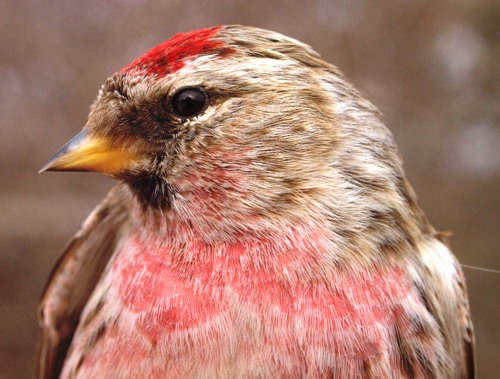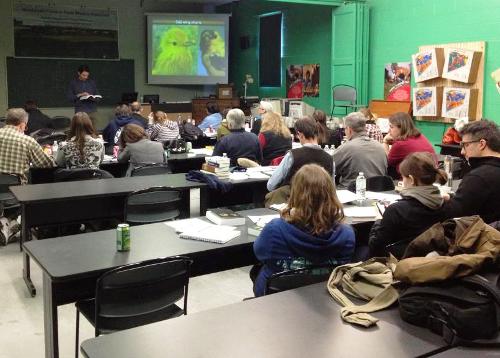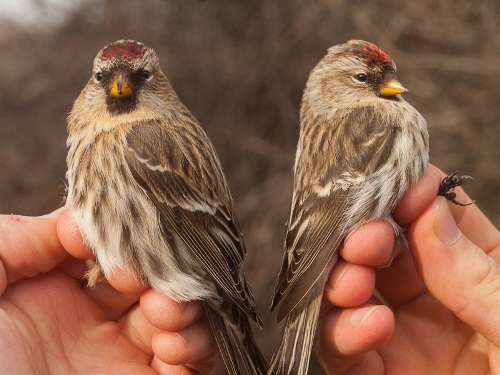|
February 1 - February 28, 2013 |
Welcome
to the McGill Bird Observatory weekly report.
Click here for a complete listing of our archives.
Comments or
questions are welcome at "mbo AT migrationresearch.org".
|
PICTURE
OF THE MONTH: |
|

February was the month of the Common Redpoll at MBO, with 87 banded,
including this boldly coloured after-second-year male.
(Photo by Simon Duval)

|
MBO
gratefully acknowledges the support provided for winter 2012-2013 by Bird Protection Quebec, in the form of bird seed to keep the MBO feeders stocked throughout the season.
|
|
|
|
THIS MONTH |
THIS WINTER |
2013 TOTAL |
SITE TOTAL |
|
# birds (and species) banded |
97 (6) |
529 (16) |
97 (6) |
41512 (111) |
|
# birds (and species) repeat |
17 (4) |
158 (13) |
17 (5) |
7998 (70) |
|
# birds (and species) return |
16 (6) |
38 (10) |
16 (6) |
1225 (38) |
|
# species observed |
24 |
39 |
30 |
207 |
|
# net hours |
11.0 |
153.5 |
11.0 |
69300.7 |
|
# birds banded / 100 net hours |
881.8 |
344.6 |
881.8 |
60.0 |
|
|
Note: table does not include nocturnal banding (owls) |
|
Banders-in-charge: Simon Duval, Marcel Gahbauer, Gay Gruner
Assistants: Jean Demers, Monique Groulx, Alison Hackney, Lisa Keelty, Clémence Soulard
Notes: For the most part, winter remained in full force in February, with the snow depth continuing to accumulate, and plenty more cold days. As a result, the frequency of visits dropped this month, with only five, but on the last two of those it was mild enough to fit in a brief period of banding. On one of those days we observed our first Purple Finch of the winter. We had our first returns of the winter for four species: Hairy Woodpecker, Blue Jay, Northern Cardinal, and White-throated Sparrow (although notably, the latter was a bird we banded very early in winter, and as such is not a "true" return in the sense that it has likely been here along).

The participants at this year's MBO molt and ageing workshop, taking notes while MRF Executive Director Marcel Gahbauer referenced a detail in Peter Pyle's "Identification Guide to North American Birds".
(Photo by Simon Duval)
|
Also this month, we held our fifth MBO molt and ageing workshop. This was a nearly annual event at MBO in our early years, but we had skipped a couple of years and this edition was long overdue. We took the opportunity to beef up the contents with more examples, and to develop a photo collection for practice sessions interspersed with lecture segments. We had over 20 participants, and were very impressed with everyone's eagerness and quick learning. We look forward to everyone joining us on site to apply the learned skills to spring and fall migration.
This month’s top 10 [last month's rank in brackets]
# individuals banded |
mean # individuals observed daily |
1. Common Redpoll (87) [-] |
1. Common Redpoll (43) [1] |
2. Slate-colored Junco (6) [-] |
2. House Finch (23) [2] |
3. Black-capped Chickadee (1) [-] |
3. Slate-colored Junco (13) [5] |
3. American Tree Sparrow (1) [-] |
4. Black-capped Chickadee (12) [6] |
3. White-throated Sparrow (1) [-] |
5. Mourning Dove (9) [3] |
3. House Finch (1) [-] |
6. Northern Cardinal (4) [7] |
| |
7. Downy Woodpecker (3) [9] |
| |
8. American Crow (3) [10] |
| |
9. Blue Jay (3) [8] |
| |
10. American Tree Sparrow (2) [-] |
|
Common Redpolls absolutely dominated the banding totals for February. In just two short afternoons of banding (11 net hours in total), we banded 87 Common Redpolls - more than in any previous entire winter season! Among them were a good number of rostrata individuals - darker, and much larger and heavier (on average 17 grams) than the more common flammea subspecies (averaging around 13 grams). We also banded a few more of our overwintering juncos, and one each of four more species.
We banded 39 Common Redpolls on February 22, and two days later recaptured only 5 of them ... but 48 additional "new" ones. This high level of turnover suggests that while we counted an average of 43 Common Redpolls during our five visits this month, the total number of individuals coming to the feeders was likely much higher. House Finch remained in second place for observations, with much higher numbers than in any previous February. Slate-colored Junco moved up to third place, although the mean daily count was only marginally higher than in December and January. Black-capped Chickadees also inched upward, while the number of Mourning Doves dropped off from January's record, but was still well above average.
|

Here is a comparison of one of the rostrata Common Redpolls (left) and a flammea individual banded near the end of February.
(Photo by Simon Duval)
|




